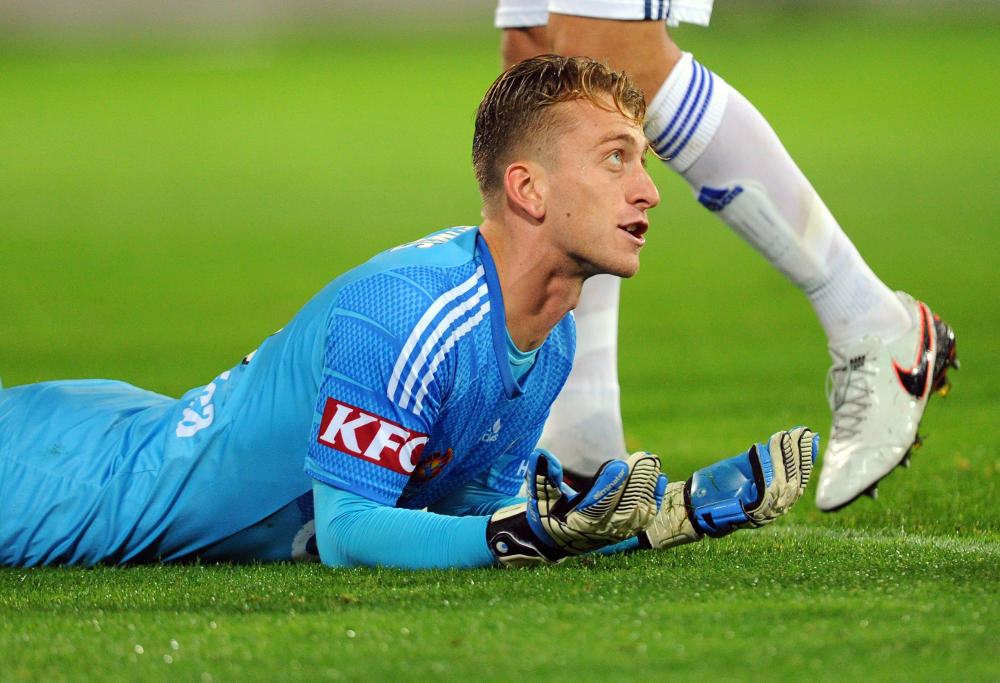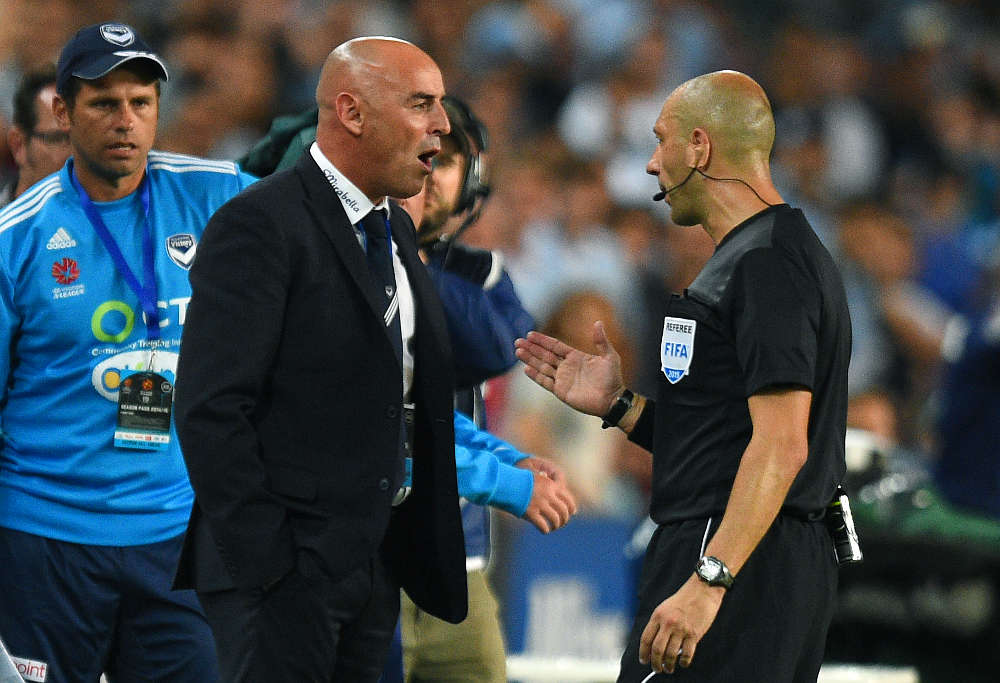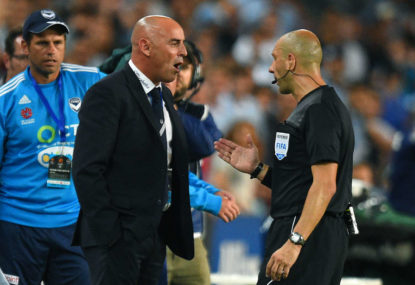In a couple of weeks’ time I hope to be a fully qualified football referee. I have been lucky enough to gain access to a course, fully funded by my employer and hope to referee some matches through the CAS season in Sydney.
The CAS competition features Knox, Cranbrook, Barker, Trinity, St Aloysius and Waverley and the standard is impressive. Being a refereeing rookie, I’m hoping to start somewhere around the 7g’s level, where the speed of the game might reflect my confidence levels and agility around the park.
The standard of officiating in the CAS is quite poor. Many of the younger referees seem to lack a ‘feel’ for the game from a players’ point of view.
A cynical foul looks different from a players’ perspective as does grubby play. An ex-player might react more strongly to football taboos, than the referee with little or no playing experience. There are some things you just don’t do.
Why would I do this? I thought it might be interesting to look at things from the perspective of the referee for a change; to catalogue the whole experience of training, preparing and officiating and all the peripheral things that come with the role, all the while, giving back to our wonderful game.
Evaluating the knowledge of the presenters throughout the process, reflecting on how well prepared a new referee feels after undergoing the training and what the actual experience feels like in terms of interaction with players, parents, supporters and other officials, might provide interesting insights.
The plan is to record my observations along the way and write to the FFA (and published on The Roar of course) with an unbiased and honest evaluation of the entire process and hopefully provide them with some concrete data to use in their planning.
Such information might help inform their thinking as they undertake the important task of training up new referees to cater for the ever increasing numbers playing the game.
Much is made of the standard of refereeing in the A-League. The general consensus appears to be that with only three full-time referees, fans are being hoodwinked under a guise of professionalism.
When part timers officiate, accusations of incompetence are rife and the full-time men cop their fair share as well. When it comes to referees, no one is spared.
And there have been some clangers, howlers and mysterious decisions this season. There’s no need to delve into the individual examples and rehash the grievances, the clear mistakes made are pretty plain for all to see.
Some incredibly soft penalties have been awarded, yellow cards flashed around and then seemingly withdrawn and at least a dozen blatantly wrong offside decisions that have either led or denied goals and undoubtedly affected the outcome of matches.

It wouldn’t be football if this wasn’t the case. These anomalies have been around since the start and will continue to be a part of the narrative of the beautiful game.
The key question is. Is it as bad as we think? Is the standard of refereeing in the A-League really poorer than most other leagues? Are the officials we see each weekend a complete bunch of ignorant blind fools who rob our teams week after week?
Personally, I think not. Sure there are moments that make us shake our heads, moments that leave awful tastes in our mouths. But does crying conspiracy and injustice each time a decision is made really help anyone?
When I get my ticket and begin refereeing, I will try to get every decision correct. I will be impartial and attempt to move around the pitch as well as I can in order to be as close as possible to the decisions on which I will adjudicate.
Yet, there is also a realisation that this will be very much, an imperfect science. What will interest me the most will be the reaction I receive from the players, managers and supporters.
Will they be abusive or defamatory in their reactions? My method to placate players, as I have used before when asked to referee in an unofficial capacity, will be to give them some sense of perspective and inform them that I am there to referee the game, not to cheat anyone or manipulate the result.
I’ll probably add that, yes, that decision may be wrong, or one you disagree with, but that is the decision and we are moving on with the game. I know there is little scope for passion in all that, but isn’t that what the role of the official really should be about?
At our highest level of professional football in Australia, my words would be futile. The hostility shown towards our officials is horrendous. A young boy I know had the privilege of ball boying at Sydney FC’s clash with the Mariners on Friday night.
The first comment he made to me after the experience was how amazed he was at the level of swearing coming from the benches. No doubt, much of that was directed at the officials.
I obviously can’t speak for you or anyone else, but I’m not sure that is the endearing memory we want our young fans to take away from their first, close up experience of the A-League.
Our managers flap arms, scream violently, spew vitriol and are, at times, asked to leave the technical area. Their aggression toward the fourth official is often even more disgusting and having a sympathetic ear so close merely encourages a continuation of the dialogue, which really should be cut short once the decision is made and the game moved on.

The tone created by managers and their assistants, filters through the game. We all know the arguments around role modelling and responsibility accepted by people in more senior positions.
While never suggesting that individual accountability be removed and all blame be levelled at those holding those senior positions in the game, there is still some onus on our managers and media to model fair minded and responsible attitudes towards our officials.
Twitter often lights up with accusations of big clubs receiving friendly decisions in some sort of respect for the value they bring in terms of money and crowds. Claims such as these are tantamount to accusations of cheating and impropriety.
If journalists, commentators and managers take this line, is it any wonder that the fans follow. Cheap shots and clichéd statements around poor referees and decisions imbedded with favouritism toward different clubs, undermine the integrity of the contest.
The A-League was won by Adelaide United last season after one of the most extraordinary runs seen in Australian football. They deserved the title and won it convincingly. Ange Postecoglou’s Brisbane Roar were once the dominant team in the nation and won their titles accordingly.
The Mariners eventually reached the pinnacle after suffering at the hands of Brisbane and Melbourne Victory have won titles in the years where they were indeed the best team over the long haul.
If our decision makers are so poor and so many games affected by appalling officialdom, why is it that we generally get the right winner when all is said and done?
Isn’t that what ultimately matters?
Constant criticism and the bemoaning of standards set by the referees will only magnify mistakes to fans who continue to lose faith in their performances. Sometimes scrutiny is warranted, yet the barrage of criticism is often a little out of perspective.
Perhaps it’s time to focus a little less on the errors and weaknesses in the refereeing ranks and see them for who they really are. People like me who love the game, yet are imperfect and flawed.
Just like all of us.































































































